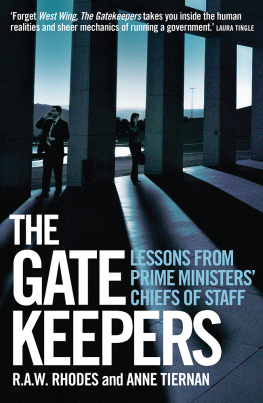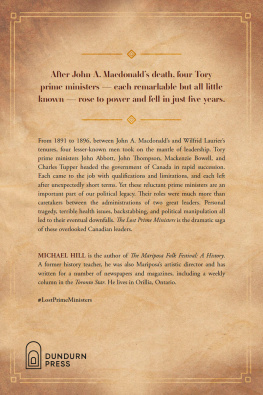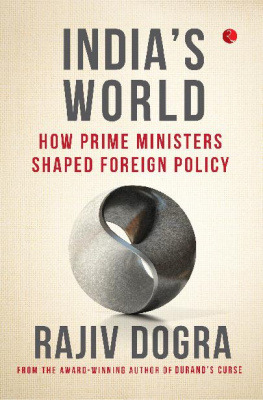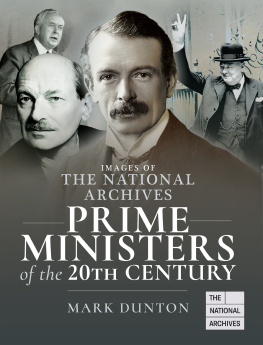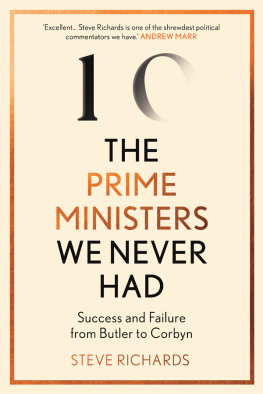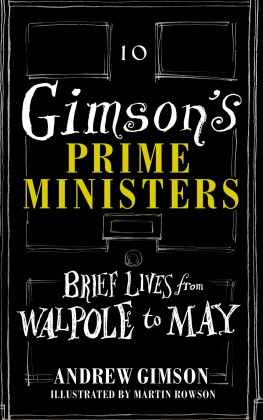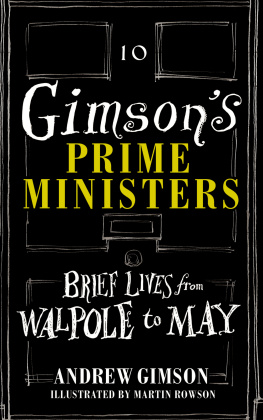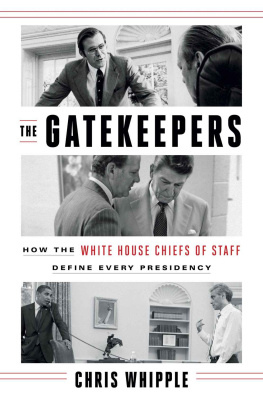R.A.W. Rhodes is Professor of Government (Research) at the University of Southampton (UK) and Professor of Government at Griffith University (Brisbane, Australia).
Anne Tiernan is an Associate Professor in the Centre for Governance and Public Policy and School of Government and International Relations at Griffith University (Brisbane, Australia).
MELBOURNE UNIVERSITY PRESS
An imprint of Melbourne University Publishing Limited
1115 Argyle Place South, Carlton, Victoria 3053, Australia
First published 2014
Text R.A.W. Rhodes and Anne Tiernan, 2014
Design and typography Melbourne University Publishing Limited, 2014
This book is copyright. Apart from any use permitted under the Copyright Act 1968 and subsequent amendments, no part may be reproduced, stored in a retrieval system or transmitted by any means or process whatsoever without the prior written permission of the publishers.
Every attempt has been made to locate the copyright holders for material quoted in this book. Any person or organisation that may have been overlooked or misattributed may contact the publisher.
Edited by Gillian Armitage
Cover design by Design by Committee
Typeset by Sonya Murphy, Typeskill
Printed in Australia by McPhersons Printing Group
National Library of Australia Cataloguing-in-Publication entry
Rhodes, R.A.W. (Roderick Arthur William), 1944 author.
The gatekeepers: lessons from prime ministers chiefs of staff/R.A.W. Rhodes and Anne Tiernan.
9780522866513 (paperback)
9780522866520 (ebook)
Includes bibliographical references.
Prime ministersStaff.
Prime ministersAustraliaHistory.
Political consultantsAustralia.
AustraliaOfficials and employeesAttitudes.
AustraliaPolitics and governmentHistory20th century.
Tiernan, Anne, 1968author.
352.23722930922
Introducing the chiefs of staff
AT THE HEART OF government are people employed to help prime ministers do their job. Perhaps the most crucial appointment is the prime ministers chief of staff (CoS). This person sets the tone of how the Prime Ministers Office (PMO) runs and how their boss works. The CoS has a broad remit, but there is no job description. They support both the person who is prime minister and the position that they hold. They run the private office, which now has more than fifty staff and operates twenty-four hours a day every day of the year. The CoS tries to ensure the prime minister sets priorities and sticks to them, notwithstanding that crises and unexpected events will inevitably demand their time and attention. They help the prime minister to control the agenda, coordinate policy initiatives and maintain effective relation ships with the cabinet, the ministry, the party room, the media and the public service.
The chief of staffs work spans being sensitive to their bosss most basic needs such as feeding, watering and getting enough sleep. At the same time they are the prime ministers gatekeeperfiltering who they see and how and where they spend their time. It is hard to find out who the CoS are and what they do. It is a difficult and often fruitless search on official Australian government websites to find any information about the prime ministers CoS or their work. Only twenty-six people have held this position since Whitlam formalised the office in 1972, but our research ends with the twenty-fourth, Ben Hubbard (see pp. 1011). Evocative phrases are used to describe them such as the hidden face of power, and the people who live in the dark. Such phrases mislead. Their world has changed. They no longer lurk in the background. They are public figures subject to commentary and often to criticism in the media.
Nowhere has this been more apparent than with Australias current Prime Ministers CoS, Peta Credlin. Within months of becoming prime minister, Tony Abbott became all too aware of the perils arising from the visibility of his political gatekeeper. Persistent rumblings became a crescendo of complaint about the working of his office and his high-profile CoS. Within three months of winning office, the press gallery feasted on reports that Credlin had berated Immigration Minister Scott Morrison over his poor performance at a media conference. Queensland Senator Ian Macdonald (a shadow minister who described being left out of Abbotts ministry as the worst day of his life) accused the PMO of exercising obsessive centralised control. Unhelpfully for Abbott, a number of disgruntled (and not surprisingly, unnamed) Coalition MPs weighed in to express private concerns about the behaviour of unelected advisers, notably Credlin. The Prime Minister was forced to defend his staffers, telling journalists Decisions made by my chief of staff and my office have my full backing and authority. Abbott calls Credlin, who has worked for him since 2009 and was CoS to Opposition leaders Brendan Nelson and Malcolm Turnbull, the force majeure. But even Abbotts supporters complain No one person should have that much influence Its too close. The Prime Ministers rebuke of internal dissenters was followed by his Finance Minister, Mathias Cormann, who launched a staunch defence of Credlin, calling on her critics to back off. He argued Credlin had played a central role in Opposition and securing the Coalitions election victory. She obviously has a very important job at the heart of the government and she will be central to our success.
Such complaints about the control freakery of the CoS and PMO are so common as to be almost routine, particularly during the transition to government. Similar complaints were levelled against the offices of Paul Keating, John Howard, Kevin Rudd and Julia Gillard. Central control over staffing and other appointments, over the timing and scheduling of media appearances and policy announcements are insurance against mistakes and missteps as ministers and ministerial staff seek to cope with the rigours and scrutiny of being in government. If the tone is respectful and the government is going well, most of its members will wear such control. If ministers and elected representatives feel they are not being heard; if they think they are not getting a share of the leaders time and attention; and if central control becomes entrenched as a governing style, then they push back. Attacks on the CoS and the PMO are proxies for attacks on the leader. The CoS are the lightning rod of discontent for those unwilling to confront the prime minister. They are the shock absorbers of prime ministerial frustration and displeasure. They manage conflicts between ministers and their departments and in the party room. And they must do all this without committing the cardinal sin of themselves becoming the story.
Centralisation is not the only criticism. Much concern is expressed about the growth in political appointments and the expansion of the PMO under recent Australian prime ministers. The table and organisation charts on pp. 69 show the growth in both staff numbers and the increasingly diverse responsibilities of the CoS and PMO from 19832013. Leaders have been the primary drivers of these changes, but the move to the new Parliament House in 1988 was also decisive. The design provided additional space to accommodate a larger, more functionally specialised prime ministerial support staff. These developments have been essentially bi-partisan. Each prime minister has built on the foundations of their predecessor in fashioning the modern hybrid advisory system that includes a large, active and partisan PMO and non-partisan career officials in the Department of the Prime Minister and Cabinet (PM&C).



